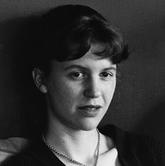 Sylvia Plath, 1932-63. Image courtesy of poets.org. Sylvia Plath, 1932-63. Image courtesy of poets.org. The above is from Sylvia Plath's journals. I've been rereading some of them lately, with the unease that always swims up. It's especially strong with Plath - I never feel quite so intent or so queasy when reading Virginia Woolf's diaries, say, or Mary Wollstonecraft's love letters. It's the voyeurism that does it, of course. But it's something else too. Plath's best poems give me a similar feeling. The more I think about it, the more I realize it comes from an assumption built into her writing - the assumption that the reader is with the speaker, on the speaker's side. *Is* the speaker, in fact. It's the root of the uncanniness of her work, I think. The poems often address someone directly - "Daddy," for instance - but they also address a reader, whether overtly or subtly. Plath knows and accepts that she is being read. In "Tulips,"she writes, "Nobody watched me before, now I am watched." A few lines later, she suddenly tells us, "I see myself[.]" Here's the trick: she has turned herself into the onlooker, and, at the same time, turned the onlooker into her. Not many writers can pull this off. Most want readers to understand what they describe, but Plath simply assumes they have slipped into her clothing and flesh, and are not just watching her, but also speaking her voice alongside her (the poem ends with an image of a mouth). Plath's journals were private, but even here we can feel a reader built in, and that reader mouths everything Plath says. It makes me think about writing the voices of the dead, real and otherwise. Historical writers have to do it. And we have to assume we have it right, that the actual person would have spoken in the voice we give them, if not always in so many words. I think we often feel the dead looking over our shoulders. For a long time I felt uneasy about resurrecting Daniel Boone and his family and others. I felt uneasy about giving them voices, especially when so little of their own remains. And I think the only thing to be done about this unease is to try Plath's magic - to feel the dead characters watch us even as we try to inflate them with life. To watch and be watched at once. To be two sets of eyes and two mouths, theirs and ours, at once.
0 Comments
Leave a Reply. |
ALIX HAWLEYI'm the author of My Name is a Knife, All True Not a Lie In It, and The Old Familiar. Archives
February 2021
Categories |
 RSS Feed
RSS Feed
